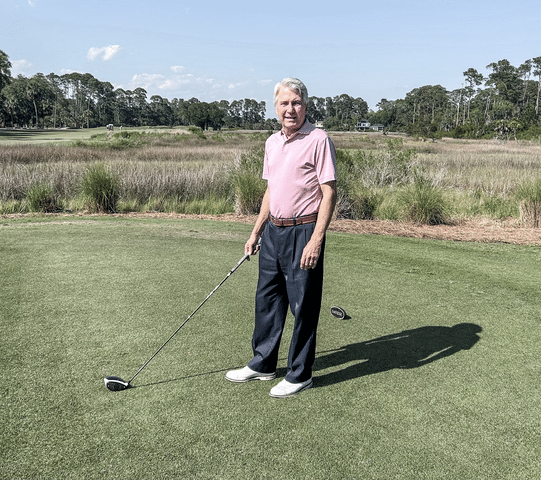After he had a heart attack in spring 2023, Ron Josey was told he would need coronary artery bypass surgery. The Savannah man did some research, and the idea of open-heart surgery made him anxious.
“I soon began to realize, if possible, that I did not want the traditional bypass with the sternotomy,” said Ron, 62, using a term for a procedure in which a surgeon opens the patient’s sternum to be able to operate on the heart.
So, it was a relief for Ron when he heard from his brother-in-law’s sister, Eva Johnson, ANP-BC, heart failure disease manager at Georgia Heart Institute in Gainesville. Eva recommended that Ron schedule an appointment at Georgia Heart Institute to discuss whether he might be a candidate for robotic heart surgery.
Georgia Heart Institute is one of only two locations in the state where robotic heart surgery is available. The minimally invasive approach offers patients the best possible outcome with less pain and shorter recovery time so they can get back to their normal lives.
This was just what Ron was looking for after his close call.
Ron and his adult son Ryan decided to go out for a quick nine holes of golf on April 11, 2023. They were getting back in their golf cart on the fifth hole when Ron began to feel dizzy and fainted. He woke up to hear his son calling 911.
Ron was transported to the cardiac catheterization lab at the local hospital. He underwent an emergency procedure to place a stent in one of his coronary arteries to stabilize his condition. That was the beginning of his treatment journey that would take him about 260 miles from home to Gainesville.
After deciding on Georgia Heart Institute, Ron scheduled a video appointment that July with Falgun Patel, MD, an interventional cardiologist who reviewed records from Ron’s emergency catheterization procedure. The visit put Ron at ease.

“My experience with Dr. Patel was fantastic,” Ron said. “He was not only very professional but had a sense of humor.”
Dr. Patel consulted with Karen Gersch, MD, a cardiothoracic surgeon who specializes in robotic surgery for coronary artery disease. Dr. Gersch agreed that Ron would be a good candidate for robotic heart surgery. She suggested a hybrid approach: robotic coronary artery bypass graft, or CABG, followed later by placement of a stent.
“Data show that this hybrid approach to treating coronary artery blockages—the combination of minimally invasive robotic coronary artery bypass grafting and angioplasty with stenting—offers better outcomes for many patients than angioplasty and stenting alone,” Dr. Gersch said.
Ron said he wasn’t worried in the lead-up to his surgery.
“Actually, I felt a feeling of relief that I might not have to endure a sternotomy,” he said. “Before I spoke to Dr. Gersch the first time, I had done my homework. I read every article, every online video and any papers I could read that she had authored. The more I learned about her education, experience and character, the more I felt I had the best doctor.”
Two weeks later, at Northeast Georgia Medical Center, Ron had his robotic surgery on a Friday, and he was released from the hospital on the following Monday. After a couple of follow-up visits with Dr. Gersch, he was turned back over to Dr. Patel for the second part of his hybrid treatment. On October 24, Dr. Patel performed an angioplasty, also called a percutaneous coronary intervention (PCI), and placed a stent to keep the artery from narrowing or closing again.
Ron said he was so pleased by his treatment at Georgia Heart Institute that he is excited to share his experience with people he talks to.
“Basically, I walk them through my experience from heart attack to needing bypass surgery,” he said. “Then, it gets interesting when I mention robotic heart surgery. So far, no one I have told even knew it exists. They are familiar with robotic surgery, but not for the heart. Once they hear about it, they are excited and eager to learn more.”
Having a heart attack was a wake-up call for Ron. He decided to make some changes to his lifestyle and focus on his overall health.
“I changed my diet completely,” he said. “Before, it was mostly sweet tea and fried foods. Now, it is mostly water, fruits and vegetables. I’ve always been active — even before my heart attack —but now I put a premium on daily exercise. It is incredible how my body has responded from these changes. Even more surprising is how easy this transition has been and how greatly rewarding!”
Click here to learn more about robotic heart surgery. Call 770-219-7099 or click the button below to connect with the team at Northeast Georgia Physicians Group Cardiovascular & Thoracic Surgery.


